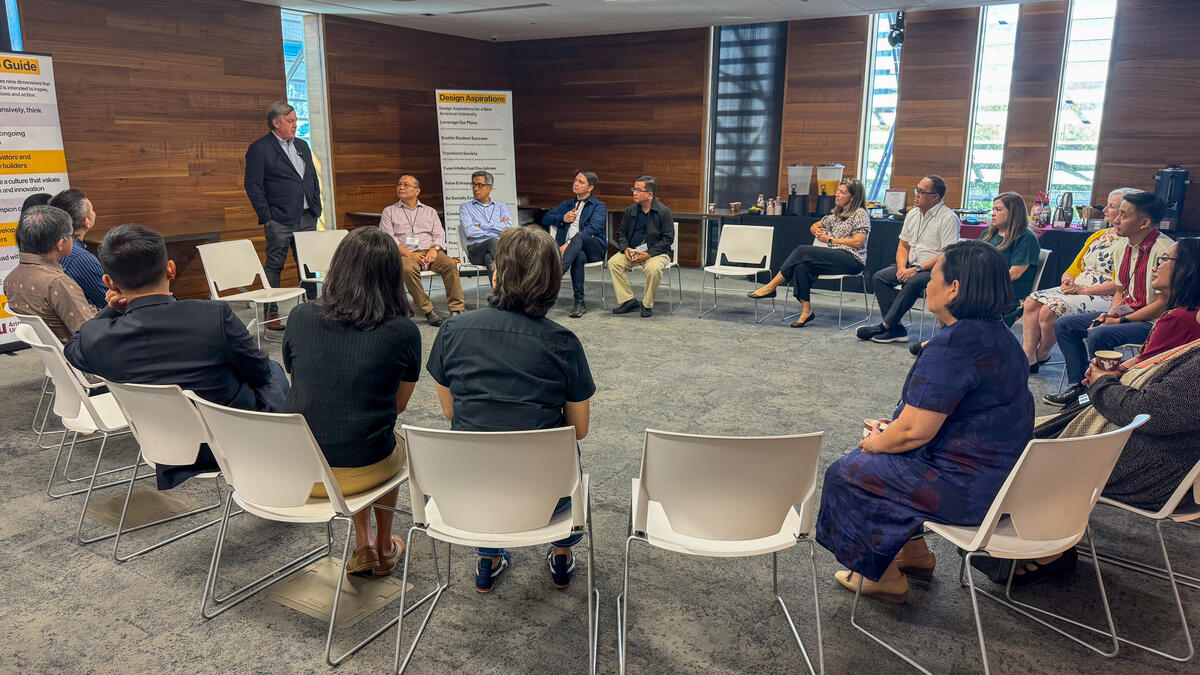Philippines UPSKILL Fellows visit Arizona State University for week-long immersive experience
The cohort included 16 leaders from 12 institutions and the Commission on Higher Education (CHED) from the Philippines.

The University Design Institute (UDI) at Arizona State University (ASU) hosted the inaugural cohort of the USAID UPSKILL Innovation Leaders Fellowship Oct 7-11, offering Filipino higher education leaders an opportunity to gain a deeper understanding of ASU’s innovative practices and learning ecosystem.
The cohort included 16 leaders from 12 institutions and the Commission on Higher Education (CHED) in the Philippines – the government agency responsible for promoting relevant and quality higher education in the Philippines – spent the week at ASU. They met with leaders from across the university, including ASU President Michael Crow, and were exposed to ASU’s best practices around inclusion, access, and impact. The group also met with ASU faculty who will be their innovation allies from across academic and administrative units to help advance specific challenges to their institution, and how collectively they can advance higher education innovation in their country.
The Higher Education Innovation Leaders Fellowship Program is one of the key higher education capacity strengthening initiatives of the U.S.-Philippines Partnership for Skills, Innovation, and Lifelong Learning (UPSKILL) Program, funded by the United States Agency for International Development (USAID)/Philippines and led by RTI International. ASU, by way of UDI, was one of three U.S. universities invited to support the implementation of the UPSKILL program.
The week kicked off with a comprehensive overview of UDI, and its six design imperatives that are fundamental to university transformation, as well as an introduction to ASU. Throughout the rest of the week, the Fellows engaged with university leaders on learner engagement, student success, resource and partnership development, research and innovation, artificial intelligence, and more. The group also had the opportunity to tour key facilities throughout the Tempe campus, including the Dreamscape Experience, Interdisciplinary Science and Technology Building IV, and ASU’s Hayden Library.
“The visit (to ASU) eclipses everything,” said Maria Teresa Trinidad Tinio, Senior Vice President for Academic Affairs at Far Eastern University. “Listening to the heads of the units who have spoken to us. What is inspiring is the passion in which they believe in their mission and they pursue it.”
Designing the New Philippines University
On Tuesday, October 8, the cohort spent time with ASU President Michael Crow to discuss the design of the New American University at ASU. Crow emphasized that the focus should not be on designing the New American University for the Philippines, but rather a “New Philippines University” that is designed and capable of addressing the country’s unique challenges.
“We (at ASU) say that we take fundamental responsibility for the outcomes, the economic outcomes, the social outcomes and the health outcomes,” said President Crow. “When you start taking responsibility for the design of your universities, you begin to alter the way the university thinks about itself.”
President Crow also emphasized how despite the country’s unique geographical challenges with millions of people dispersed over thousands of islands around the country, there are still opportunities to find new ways to capture learners.
“You have these people spread out all over the place, and they're at different levels of economic development and infrastructure development. All of that can be overcome now. All of it with the modern technologies that exist. People can be learning everywhere,” he said. “There's no barriers, there's no constraints, there's no wires that have to be built. There's nothing that can’t happen anywhere.”
The overall goal for the Fellowship and the visit to Arizona State University is to support the transformation of the Philippine higher education ecosystem through best practices, network development, and shared resources, with the overall goal of ensuring that colleges and universities in the Philippines deliver relevant services that respond to the challenges faced by their communities and the nation at large.
“I want the Philippines to have a university system that is very responsive to the realities of the Philippines,” said Roberto Galang, Dean of the John Gokongwei School of Management at Ateneo De Manila University. “That means universities that do a lot of cutting-edge research, showcasing Filipino concerns and how they can help the world be a better place. I want it to be inclusive so that we can upskill as many Filipinos as possible because productivity is really driven by knowledge, and our economic development can only be created by Filipinos.”
Long-term impact in the Philippines
The inaugural run of the UPSKILL Innovation Leaders Fellowship will conclude in December 2024 in a commencement ceremony in Manila. Following the graduation, UDI and the Fellows will continue to engage to create a network of higher education leaders and innovators, so that they may continue to advance higher education in the country.
“These leaders are the future of higher education in the Philippines, and their stewardship will help guide the country forward so that their institutions and the system as a whole will be better prepared to meet the needs of their nation,” said Minu Ipe, Vice Chair and Managing Director of the University Design Institute. “Through the UPSKILL initiative, we are building capacity for transformation across the higher education landscape.”
The UPSKILL program is a five-year initiative that will train fellows throughout the duration of the program. In addition to the Fellowship, the University Design Institute is also responsible for a multi-cohort Transformation Accelerator that will engage multiple universities on their own unique design challenges, as well as a Collaboratory that will act as a knowledge repository for the country.